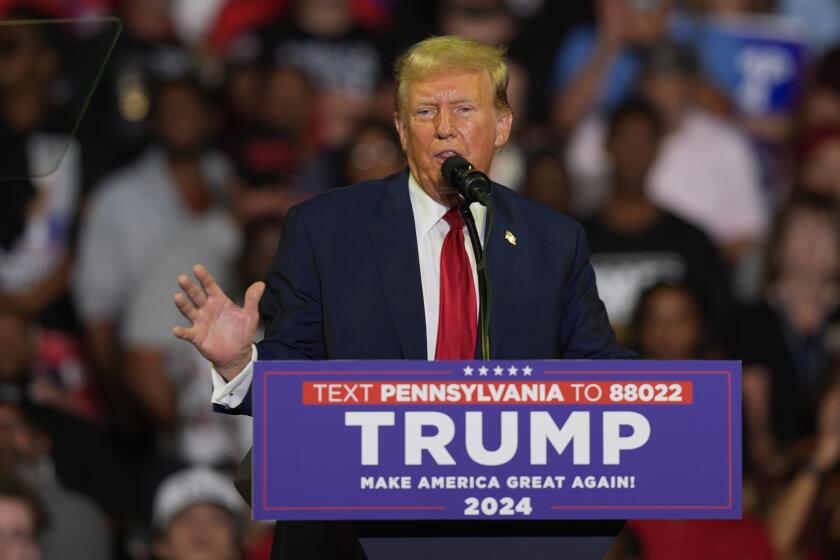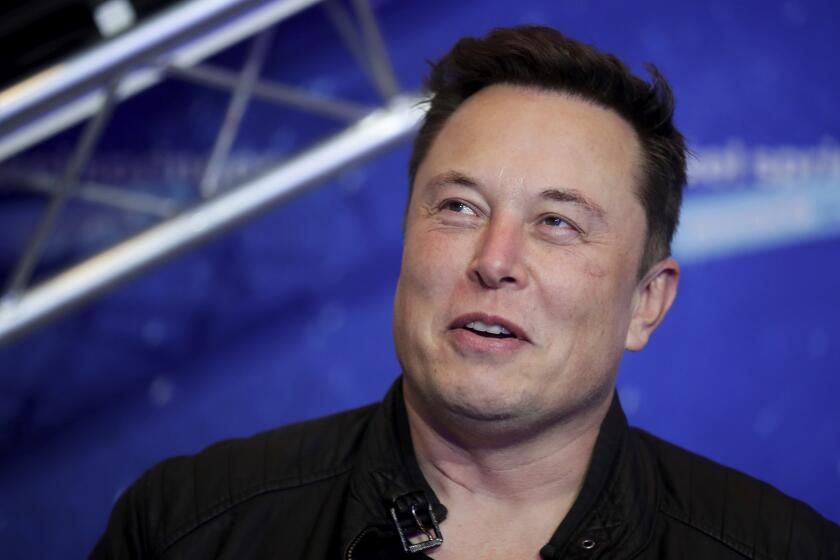As Trump’s business advisory council meets, CEOs in tricky situation
- Share via
As President Donald Trump’s business policy forum met for the first time Friday morning, its CEO members found themselves in a tricky spot.
In the days ahead of the meeting, fallout over Trump’s recent executive order on immigration triggered divergent responses from the panel’s powerful business chiefs.
Under immense pressure from customers, Uber’s Travis Kalanick criticized the executive order and quit the group. Tesla’s Elon Musk said he would use the meeting to “offer suggestions for changes” to Trump’s controversial action, which temporarily banned all refugees and travelers from seven Muslim-majority nations from entering the U.S.
Other CEOs on the panel, called the President’s Strategic and Policy Forum, did not speak out — among them Walt Disney Co.’s Robert Iger. The group’s lone entertainment executive, Iger, 65, missed the gathering after it was moved to the same date as a previously scheduled Disney board meeting, according to a company spokesman.
Like other powerhouses of corporate America, Disney stands to benefit from some of Trump’s goals, such as lowering corporate taxes. But with its vast global reach, the Burbank entertainment giant could also be adversely affected by some of Trump’s potential moves on immigration and foreign policy.
“It’s a tough choice for all executives — and this is definitely going to be challenging for Iger and Disney to navigate, because of not only the employees that work for Disney, but also their business interests, customers and stakeholders,” said David Smith, associate professor of economics at the Pepperdine Graziadio School of Business and Management. “Given the uncertainty surrounding what is actually going to happen with the Trump administration, a cautious approach is to be expected and is likely prudent.”
Disney counts on millions of foreign tourists who reliably visit its domestic theme parks and resorts each year. The company, which employs about 185,000, also hires foreign workers, including at least some who have come to the U.S. under the H-1B visa program, which Trump has signaled he could revamp. Then there’s the Shanghai Disney Resort, a roughly $5.5-billion project that opened last year. Trump has been critical of China’s fiscal policy, sparking concerns of a significant rift with the world’s most populous country.
Disney has taken public stances on social and political issues over the years — such as its 2016 threat to stop making movies in Georgia over legislation there that was perceived as anti-gay. In that case, Disney was credited with putting pressure on Gov. Nathan Deal, who eventually vetoed the bill that would have offered protections to faith-based entities that refused to provide services that they said violated their beliefs.
But Disney also is one of the more image-conscious companies in corporate America, and is typically careful to not take positions that could offend its customer base, which, like any major enterprise, includes people of many political and ideological perspectives.
Hollywood, of course, is known for being a bastion of liberalism and strongly backed Hillary Clinton during the election. And these days, Disney, which is valued at more than $170 billion, is a dominant company in industry.
Over the last week, Iger, a Democrat who supported Clinton, has been criticized on social media for not quitting the panel. Attention was drawn to the issue after a consumer watchdog group, SumOfUs, created a petition that called for all members of the forum to condemn the immigration ban and “stop collaborating with [Trump’s] dangerous administration.”
Disney did not respond to requests to interview Iger.
When he was named to the panel in December, Iger said: “I welcome the chance to be part of the important discussions about the most effective ways to grow jobs and expand economic opportunity in America.”
Before Trump’s immigration executive order, it appeared imprudent for business leaders to speak out against the president, who since his election has used social media to chastise companies including Boeing. But after the order was signed Jan. 27 and protests erupted over the detaining of travelers at airports across the U.S., several prominent CEOs criticized the action, including Netflix’s Reed Hastings and Apple’s Tim Cook.
Friday’s meeting was well reviewed by some of the 17 business leaders who attended. Participants included those who backed Clinton in the election and others who had supported different Republican presidential hopefuls. Jack Welch, the former chief executive of General Electric, told CNBC that Trump had “engaged forcefully” on every topic.
Jeffrey Sonnenfeld, associate dean of leadership programs at the Yale School of Management, said he had spoken with “a number” of the attendees after the meeting, and “to a person they were pleased with the meeting.”
“People with very different political points of view, they didn’t feel this meeting … was exploitative in any way,” said Sonnenfeld. “There is no implied endorsement with being there. A number were happily surprised by how open [Trump] is.”
The president opened the meeting by saying that he looked forward to discussing “all of the things that we can do to bring back our jobs, get taxes even lower. … I want to have your input ... and hear what we have to do in terms of regulations.” (Shortly after attending the meeting, Trump ordered a review of Dodd-Frank, the 2010 Wall Street reform measure, and suspended a conflict-of-interest rule for retirement advisors.)
Kalanick is the only executive to have quit the forum. He was pressured by customers to leave the council, in part because of his initial response to the fallout over the executive order. His ride-hailing company came under fire on Jan. 28 for announcing on Twitter that it was operating normally at New York’s John F. Kennedy International Airport amid a taxi strike called to protest the order. Some interpreted Uber’s move as an attempt to capitalize on the strike. Kalanick also released a statement on the same date that defended his decision to remain on Trump’s panel.
Customers reacted harshly, and in recent days the hashtag #DeleteUber has trended on Twitter. Kalanick ultimately had a change of heart, telling his staff in a memo Thursday that he’d voiced concerns to Trump about the executive order and quit the council.
A White House official said the Trump administration would like the group to meet monthly or quarterly.
“If it turns out that this comes off as being cosmetic in some ways, and not leading to a meaningful voice, then there would be, I think, a great sense of disappointment,” Sonnenfeld said. “But it looks like these people are truly being heard.”
Times staff writers Tracey Lien and Noah Bierman contributed to this report.
UPDATES:
4:12 p.m.: This article was updated with additional commentary from analysts.
This article was originally published at 11:30 a.m.
More to Read
Inside the business of entertainment
The Wide Shot brings you news, analysis and insights on everything from streaming wars to production — and what it all means for the future.
You may occasionally receive promotional content from the Los Angeles Times.











